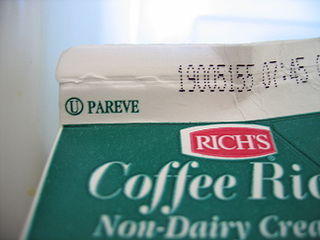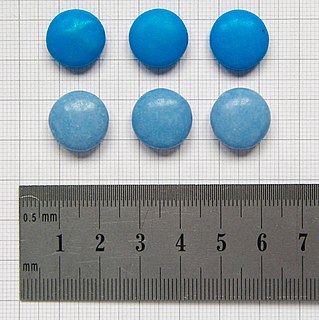Related Research Articles
Flavor, flavour, or taste is the perceptual impression of food or other substances, and is determined primarily by the chemical senses of the gustatory and olfactory system. The "trigeminal senses", which detect chemical irritants in the mouth and throat, as well as temperature and texture, are also important to the overall gestalt of taste perception. The taste of food, can be altered naturally or artificially.

Food is any substance consumed to provide nutritional support for an organism. Food is usually of plant, animal or fungal in origin, and contains essential nutrients, such as carbohydrates, fats, proteins, vitamins, or minerals. The substance is ingested by an organism and assimilated by the organism's cells to provide energy, maintain life, or stimulate growth. Different species of animals have different feeding behaviours that satisfy the needs of their unique metabolisms, often evolved to fill a specific ecological niche within specific geographical contexts.
Kashrut is a set of dietary laws dealing with the foods that Jews are permitted to eat and how those foods must be prepared according to Jewish law. Food that may be consumed is deemed kosher, from the Ashkenazi pronunciation of the Hebrew term kashér, meaning "fit".

Bread is a staple food prepared from a dough of flour and water, usually by baking. Throughout recorded history, it has been a prominent food in large parts of the world. It is one of the oldest man-made foods, having been of significant importance since the dawn of agriculture, and plays an essential role in both religious rituals and secular culture.

Flour is a powder made by grinding raw grains, roots, beans, nuts, or seeds. Flours are used to make many different foods. Cereal flour, particularly wheat flour, is the main ingredient of bread, which is a staple food for most cultures. Corn flour has been important in Mesoamerican cuisine since ancient times and remains a staple in the Americas. Rye flour is a constituent of bread in central and northern Europe.

Organic certification is a certification process for producers of organic food and other organic agricultural products. In general, any business directly involved in food production can be certified, including seed suppliers, farmers, food processors, retailers and restaurants. A lesser known counterpart is certification for organic textiles that includes certification of textile products made from organically grown fibres.

Food processing is the transformation of agricultural products into food, or of one form of food into other forms. Food processing includes many forms of processing foods, from grinding grain to make raw flour to home cooking to complex industrial methods used to make convenience foods. Some food processing methods play important roles in reducing food waste and improving food preservation, thus reducing the total environmental impact of agriculture and improving food security.

The Codex Alimentarius is a collection of internationally recognized standards, codes of practice, guidelines, and other recommendations relating to foods, food production, and food safety.

The United States Federal Food, Drug, and Cosmetic Act, is a set of laws passed by Congress in 1938 giving authority to the U.S. Food and Drug Administration (FDA) to oversee the safety of food, drugs, medical devices, and cosmetics. A principal author of this law was Royal S. Copeland, a three-term U.S. Senator from New York. In 1968, the Electronic Product Radiation Control provisions were added to the FD&C. Also in that year the FDA formed the Drug Efficacy Study Implementation (DESI) to incorporate into FD&C regulations the recommendations from a National Academy of Sciences investigation of effectiveness of previously marketed drugs. The act has been amended many times, most recently to add requirements about bioterrorism preparations.

The Federal Insecticide, Fungicide, and Rodenticide Act (FIFRA) is a United States federal law that set up the basic U.S. system of pesticide regulation to protect applicators, consumers, and the environment. It is administered and regulated by the United States Environmental Protection Agency (EPA) and the appropriate environmental agencies of the respective states. FIFRA has undergone several important amendments since its inception. A significant revision in 1972 by the Federal Environmental Pesticide Control Act (FEPCA) and several others have expanded EPA's present authority to oversee the sales and use of pesticides with emphasis on the preservation of human health and protection of the environment by "(1) strengthening the registration process by shifting the burden of proof to the chemical manufacturer, (2) enforcing compliance against banned and unregistered products, and (3) promulgating the regulatory framework missing from the original law".

In kashrut, the dietary laws of Judaism, pareve is a classification of edible substances that contain neither dairy nor meat ingredients. Food in this category includes all items that grow from the ground, fish, eggs, and non-biological edible items. Kashrut forbids consuming mixtures of milk and meat, consuming milk and meat at the same meal, consuming dairy foods within a period of time after consuming meat, and using the same dishes for both dairy and meat. Pareve foods, being neutral, can be consumed with either dairy or meat.

Diquat is the ISO common name for an organic dication that, as a salt with counterions such as bromide or chloride is used as a contact herbicide that produces desiccation and defoliation. Diquat is no longer approved for use in the European Union, although its registration in many other countries including the USA is still valid.
The law in the UK on food labelling is multifaceted and is spread over many reforms and parliamentary acts, making the subject complex. It must comply with the relevant rules in the European Union, for which the main law relating to food labelling is Regulation (EU) 1169/2011, which is implemented in the UK in the Food Information Regulations 2014, the Food Information (Wales) Regulations 2014, the Food Information (Scotland) Regulations 2014 and the Food Information Regulations 2014.

Natural food and all-natural food are widely used terms in food labeling and marketing with a variety of definitions, often to imply foods that are not ultra-processed. In some countries like the United Kingdom, the term "natural" is defined and enforced; in others, such as the United States, it is not enforced although there is for example USDA enforcement of organic labelling.

A lotion is a low-viscosity topical preparation intended for application to the skin. By contrast, creams and gels have higher viscosity, typically due to lower water content. Lotions are applied to external skin with bare hands, a brush, a clean cloth, or cotton wool.
Soy molasses is brown viscous syrup with a typical bittersweet flavor. A by-product of aqueous alcohol soy protein concentrate production, soy molasses is a concentrated, desolventized, aqueous alcohol extract of defatted soybean flakes.

A tree nut allergy is a hypersensitivity to dietary substances from tree nuts and edible tree seeds causing an overreaction of the immune system which may lead to severe physical symptoms. Tree nuts include, but are not limited to, almonds, Brazil nuts, cashews, chestnuts, filberts/hazelnuts, macadamia nuts, pecans, pistachios, shea nuts and walnuts.
Green cleaning refers to using cleaning methods and products with environmentally friendly ingredients and procedures which are designed to preserve human health and environmental quality. Green cleaning techniques and products avoid the use of products which contain toxic chemicals, some of which emit volatile organic compounds causing respiratory, dermatological and other conditions. Green cleaning can also describe the way residential and industrial cleaning products are manufactured, packaged and distributed. If the manufacturing process is environmentally friendly and the products are biodegradable, then the term "green" or "eco-friendly" may apply.

Food contamination refers to the presence of harmful chemicals and microorganisms in food, which can cause consumer illness. This article addresses the chemical contamination of foods, as opposed to microbiological contamination, which can be found under foodborne illness.

Organic food is food produced by methods complying with the standards of organic farming. Standards vary worldwide, but organic farming features practices that cycle resources, promote ecological balance, and conserve biodiversity. Organizations regulating organic products may restrict the use of certain pesticides and fertilizers in the farming methods used to produce such products. Organic foods typically are not processed using irradiation, industrial solvents, or synthetic food additives.
References
- 1 2 Blythman, Joanna (21 February 2015). "Inside the food industry: the surprising truth about what you eat". The Guardian. Archived from the original on 13 August 2016. Retrieved 28 October 2016.CS1 maint: BOT: original-url status unknown (link)
- ↑ "Processing Aids Used in Modern Food Production". International Food Information Council. 23 May 2014. Archived from the original on 19 October 2016. Retrieved 28 October 2016.
- ↑ "Bread Labelling Transparency". Sustainweb.org. Retrieved 2016-10-28.
- ↑ "Processing aids". Sustainweb.org. doi:10.1016/j.jcs.2007.05.004 . Retrieved 2016-10-28.
- ↑ Andrew Whitley (2011-08-17). Bread Matters: The State of Modern Bread and a Definitive Guide to Baking ... p. 14. ISBN 9781449418915 . Retrieved 2016-10-28.
- ↑ Oliver Nieburg (2011-10-19). "Federation of Bakers and Real Bread Campaign at odds over labelling of bread processing aids". Bakeryandsnacks.com. Retrieved 2016-10-28.
- ↑ Bee Wilson (2010-10-15). Sandwich: A Global History. p. 55. ISBN 9781861898913 . Retrieved 2016-10-28.
- ↑ Jukes, David. "'Processing Aid' Definition". Foodlaw-Reading. University of Reading. Archived from the original on 2007-07-14. Retrieved 28 October 2016.
- ↑ Andrews, James (10 June 2013). "Processing Aids: What's Not on the Label, and Why?". Food Safety News. Archived from the original on 2015-02-15. Retrieved 28 October 2016.